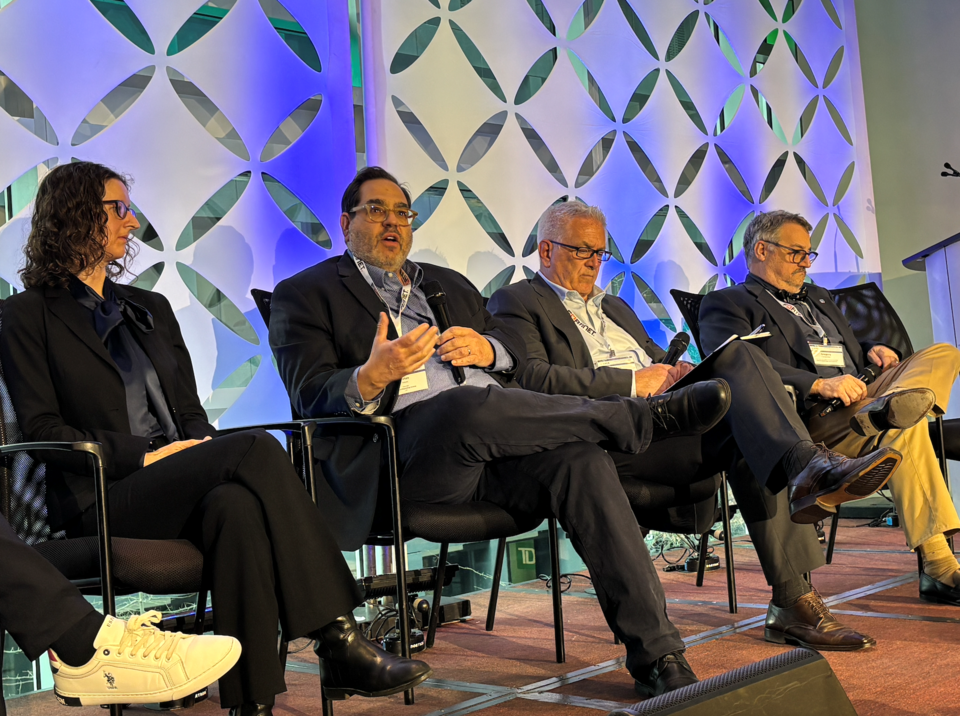Canadians are not readily seeing the risks of disinformation in social media networks and a key to solving this problem is better media literacy for youth, said experts at the Vancouver International Security Summit on Tuesday.
“I think we do need to question what we see; I think we need to question perspectives,” said University of B.C. journalism professor Peter Klein, who founded the Global Reporting Centre.
“To me, one of the most important things that we can do is train younger people to be more sophisticated that way,” said Klein, who took part in a panel discussion on disinformation in the context of the summit’s focus on foreign threats to democratic systems.
“Question everything,” from the U.S. National Security Agency to so-called “woke” ideologies in academia, said Klein, with passing reference to fellow panellist Gregory Carpenter, a former NSA operations officer.
Carpenter agreed, saying Scandinavian countries are already on this path.
“It’s a very important component,” said Carpenter.
Panellist Calvin Chrustie, who has focused much of his professional career on transnational organized criminal networks, first as a senior operations officer with the federal RCMP and then as a private risk consultant for Critical Risk Team, agreed.
“When you do a comparative analysis of education systems, when you go to Finland, for example, by the time you’re in Grade 10, you’ve had a course on disinformation, misinformation, how to identify it, how to mitigate it and how to approach this. I don’t see that with my 18-year-old step-son who just graduated from public school” in Canada, said Chrustie.
Panellists had been discussing how disinformation networks from foreign adversaries are laying the groundwork for corrosive forces against democratic institutions.
Framing the matter was University of B.C. historian Heidi Tworek, who told the summit “pre-bunking” may be more effective than “de-bunking” disinformation.
Tworek said disinformation — the deliberate spread of false information — and misinformation — incorrect or misleading information — spread by foreign governments is not new, case in point her research on Nazi Germany’s use of radio to spread antisemitic views globally in the 1920s and 1930s.
What is new is the means, such as social media and, now, generative artificial intelligence such as “deepfake” videos.
Tworek said we need a consensus on how institutions and politicians provide information; so, what platforms do they use and what languages?
“Disinformation flourishes in an information vacuum. Institutions need to prevent an information vacuum,” said Tworek, who favours regulating platforms for disinformation.
And, said Tworek, civil society organizations also need help and when matters go awry there needs to be policies against harassment.
Police also need to be aware of these threats to civilians, she said.
“So there’s a whole battery of things we can be doing,” said Tworek.
With those reforms in mind, Klein said we are not returning to the age of consensus as we once knew it to be, with a television news anchor like Walter Cronkite espousing the truth, at least from his perspective.
Klein said what was once “spin” is now “disinformation” albeit it is “weaponized on steroids” through social media.
Attendees heard troll mills in Russia and China have accelerated distrust in the old media model.
“There is this whole notion of the fourth estate, of journalism, that has been so undermined,” said Klein.
And local domestic actors have latched on, namely, U.S. president-elect Donald Trump, said Klein, in an effort to dissuade people’s belief in journalists and in turn, undermine their critiques of powerful entities.
“What can you trust?” asked Carpenter, explaining that it is true that our own governments spread misinformation.
Carpenter cited , only to be revealed decades later and not widely publicized.
“We have to take a good look at the supply chain of information, how it's constructed and who has possession,” said Carpenter.
In that vein, moderator Joe Adam George of the MacDonald Laurier Institute said “Trump has been a buzzword” at the summit, granted he has vowed to reform U.S. intelligence agencies, having accused them of subverting his election campaigns.




